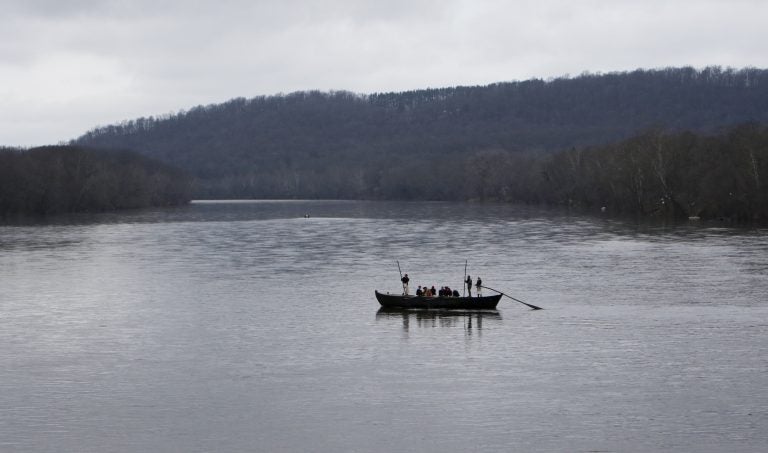With Delaware River running low, Philly area Christmas tradition may be left high and dry
The Delaware may be too low for the docks and boats used in the annual re-enactment of George Washington’s iconic river crossing during the Revolutionary War.

FILE- In this Dec. 25, 2015, file photo, a group of Revolutionary War re-enactors row a Durham boat during the re-enactment of Washington crossing the Delaware River, in Washington Crossing, Pa. Re-enactors might not be able to make their annual Christmas Day trip across the Delaware River between Pennsylvania and New Jersey because low water levels make it impossible for them to navigate their wooden Durham boats. (AP Photo/ Joseph Kaczmarek, File)
Every Christmas, thousands flocks to the shores of the Delaware River about 36 miles northeast of Philadelphia to commemorate George Washington’s iconic river crossing during the Revolutionary War. Typically, re-enactors cap off the festivities with a crossing of their own, but this year, the river may be too low to accommodate the docks and boats used for the event.
George Calaba, park manager at Washington Crossing Historic Park, which hosts the event, said people should wish for a storm or cross their fingers. “Whatever you need to do to make it rain,” he said.
The water needs to be around nine feet deep to ensure a safe passage, said Calaba. Right now, the river is only at about eight and a half feet, he said. While there’s a bit of rain in the forecast for this week, meteorologists aren’t calling for the type of deluge typically needed to boost water levels by half a foot.
Calaba stressed there will be festivities on Christmas Day. A 45-minute program at Washington Crossing Historic Park will feature speeches, cannon fire, and other choreographed re-enactments, even if the crossing itself cannot go on.
The annual crossing draws between 5,000 and 15,000 spectators to the banks of the Delaware, said Calaba. The tradition dates back nearly 70 years, although in past years re-enactors have been thwarted by adverse river conditions.
Calaba said he did not know the last time the festivities didn’t include a river crossing, but John Godzieba, the actor who has played George Washington for the past seven years, said the crossing has never been cancelled during his tenure.
More than just the subject of a stirring painting, Washington’s crossing of the Delaware marked a turning point in the Revolutionary War.
On Christmas night 1776, Washington led a depleted Continental Army across the icy river and on to Trenton, where they surprised a garrison of Hessian mercenaries. It was a perilous mission, and Washington considered turning back more than once.
“While he’s cheering on his troops to cross, he’s also writing a letter back to his nephew saying he doesn’t think it’s gonna work,” said Godzieba, who heads the Langhorne Police Department when he isn’t impersonating the nation’s first president.
But Washington pressed on, and the resulting victory boosted American morale in a time when hope seemed lost. After five more years of fighting, the British surrendered and the colonists won their independence.
Given the odds he surmounted 241 years ago, what would Washington have made of the low river that confronts today’s soldiers?
“He would’ve tried to find some way to get them across,” Godzieba said. “I just have that idea that he wouldn’t have given up.”
WHYY is your source for fact-based, in-depth journalism and information. As a nonprofit organization, we rely on financial support from readers like you. Please give today.





